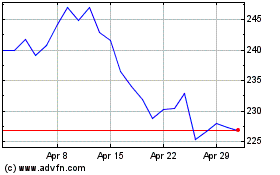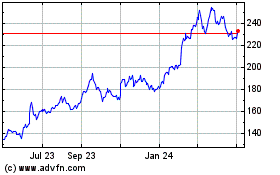Japan's Abe Defends U.S. Alliance, Warns Against Nationalism
April 05 2016 - 3:10PM
Dow Jones News
TOKYO—With Japan's longtime security ties to the U.S. called
into question in the presidential campaign, Prime Minister Shinzo
Abe on Tuesday offered a stout defense of the alliance's role in
protecting the globe and warned against "naked nationalism."
Mr. Abe also told The Wall Street Journal in an hourlong
interview that the U.S. and other wealthy nations should uphold
existing trade deals, and said he wanted to push through a Pacific
trade agreement that presidential candidates of both parties have
called a bad deal for America.
Asked whether U.S. troops could pull out of Japan and leave the
nation to defend itself—a possibility raised by Republican
front-runner Donald Trump —Mr. Abe was unequivocal.
"I cannot conceive of any situation within the foreseeable
future when the U.S. presence wouldn't be necessary," he said.
Pointing to laws passed last year by Tokyo that make it easier
for Japan to fight alongside the U.S. outside its territory, Mr.
Abe said: "By strengthening the Japan-U.S. alliance, we'll
strengthen deterrence and that will contribute to peace and
stability in the region, not just Japan."
Japan and other Asian nations have drawn unusual attention in
this year's campaign, as Mr. Trump has questioned the decades-old
bedrock of U.S. military policy in the region. Republican
candidates and Democrats Hillary Clinton and Bernie Sanders have
criticized the Trans-Pacific Partnership trade agreement, which was
reached last fall but hasn't been approved by Congress.
On the TPP, Mr. Abe said: "This is the birth of an economic zone
that has 40% of the world's [gross domestic product], one that is
protected by free and fair rules. Through it, the U.S., Japan and
the other countries participating in TPP will achieve great profit
and gain chances for growth."
He declined to discuss individual candidates directly but
alluded several times to the views of Mr. Trump, who has said the
U.S. needs to put its interests first. The Republican front-runner
has questioned the benefit of U.S. alliances, including the North
Atlantic Treaty Organization, for average Americans, saying
recently that allies are "ripping off the United States. And you
know what we do? Nothing." On Japan, Mr. Trump has said, "We have
to let them take care of themselves."
The U.S. maintains about 50,000 troops in Japan, a presence that
dates to the early post-World War II era and Cold War tensions with
the Soviet Union. Today, China's growing military might is an
important target of U.S. deterrence. Mr. Abe reiterated calls for
Beijing to stop building artificial islands on what it calls
Chinese territory in the South China Sea, where several nations
have overlapping maritime claims.
In late May, Japan will host a summit of the Group of Seven
industrialized nations, and Mr. Abe said it would be a forum to
show leadership against actions displaying "naked nationalism." He
said nations could address economic unease by boosting investment
in infrastructure.
While U.S. politicians try to address the anger of American
voters over stagnant wages and what candidates have described as an
economy tilted in favor of powerful interests, the 61-year-old Mr.
Abe is facing similar pressures at home. The leader of the
conservative, pro-business Liberal Democratic Party, he took office
in December 2012 promising that his pro-growth "Abenomics" policies
would haul Japan out of a two-decadelong funk and stimulate strong
growth.
But the economy has shrunk in two of the past three quarters and
posted just 0.5% real growth in 2015. Real wages have declined for
four years in a row, and the Bank of Japan's introduction of
negative interest rates earlier this year has failed to help.
On Tuesday, the yen strengthened to its highest level against
the dollar since October 2014, driving down the Nikkei Stock
Average 2.4%. Until recently, a weak yen—which has helped produce
record corporate profits—was seen as one of the few concrete
achievements of Abenomics.
What's more, the leading gauge of inflation has hovered around
zero recently, suggesting Mr. Abe is still far from achieving his
promise to rescue Japan from more than a decade of deflation.
Mr. Abe defended his economic program and said it was on the
road to success. He cited a strong job market and wage increases
this spring by smaller companies, although he acknowledged that
bellwether Toyota Motor Corp. was dialing back base-wage
increases.
The prime minister said other countries were responsible for
Japan's recent sluggishness and referred to the Federal Reserve's
decision to start lifting interest rates.
"Japanese markets have fluctuated significantly as world markets
have moved based on fears about an economic slowdown in China, a
fall in oil prices and the trend in U.S. interest rates, but
Japanese economic fundamentals are still solid," he said.
Still, economists widely expect further easing by the Bank of
Japan and stimulus from Mr. Abe's government this year. He hinted
that the G-7 summit would be an occasion for him to propose new
government spending in Japan and urge other developed nations to do
the same.
"In developed countries, I think there is a need to update old
infrastructure, as well as investment in infrastructure that takes
the environment into account," he said.
Write to Peter Landers at peter.landers@wsj.com
(END) Dow Jones Newswires
April 05, 2016 14:55 ET (18:55 GMT)
Copyright (c) 2016 Dow Jones & Company, Inc.
Toyota Motor (NYSE:TM)
Historical Stock Chart
From Jun 2024 to Jul 2024

Toyota Motor (NYSE:TM)
Historical Stock Chart
From Jul 2023 to Jul 2024
